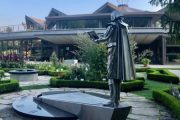So, my mother’s life had been very busy, full of social connections, until our family had emigrated to Southern Rhodesia, where, by 1957, we were living in the bush. Almost immediately she found herself isolated, at home during the day with my little brother, Peter, who was not yet 4 years of age. My father was at work from 8am till 4pm, or so, at the tiny railway station a mile or two away, and my brother John, aged 8, and I, aged 10, were both at school every day from 7:30am till about 1:00pm. Our mother must have been so lonely.
I realize now, too, that it didn’t help, of course, that conditions at home were hardly ideal. Not only did she have to cope with reptiles and insects everywhere, not to mention wild animals, as well, but the house itself had several problems. We soon learned to consider ourselves lucky if we had even an erratic trickle of reddish-brown water flowing from our taps. There were numerous days when we had no water at all.
Why didn’t we do anything to help our mother regain her usual lively demeanour? We children were so young, and we didn’t understand at that time how she was feeling. She must have put on a brave face when John and I came home from school. We were also struggling, though, in the face of relentless bullying by the other students at our small school. It is only now, when I look back and when I know more about such mental health problems, that I can understand why my mother was seriously depressed.
Luckily for all of us, she was, however, rescued, in a way, when a local accountant asked if my mother would be interested in working part-time as a receptionist in his office. My mother accepted the position, knowing that it would bring her, not only some meaningful work, but also contact with other people, something she craved. My brother, Peter, too young to attend school, would go with my father to the railway station. There, Peter would play with the local black children, becoming beloved of them all, and especially of an elderly black African, named Harley, who worked as a foreman/helper at the station. Harley was like a mentor to my little brother. He loved Peter, playing simple games with him, using a stick to draw pictures in the dirt, whittling little wooden items, pointing out various creatures, and even taking my brother with him to see his (Harley’s) family and friends in the outlying villages. Peter grew used to visiting their round rondavels, to sitting on the ground under their thatched roofs, eating whatever he was offered, being part of a second family, whose Shona language Peter even began to learn.




